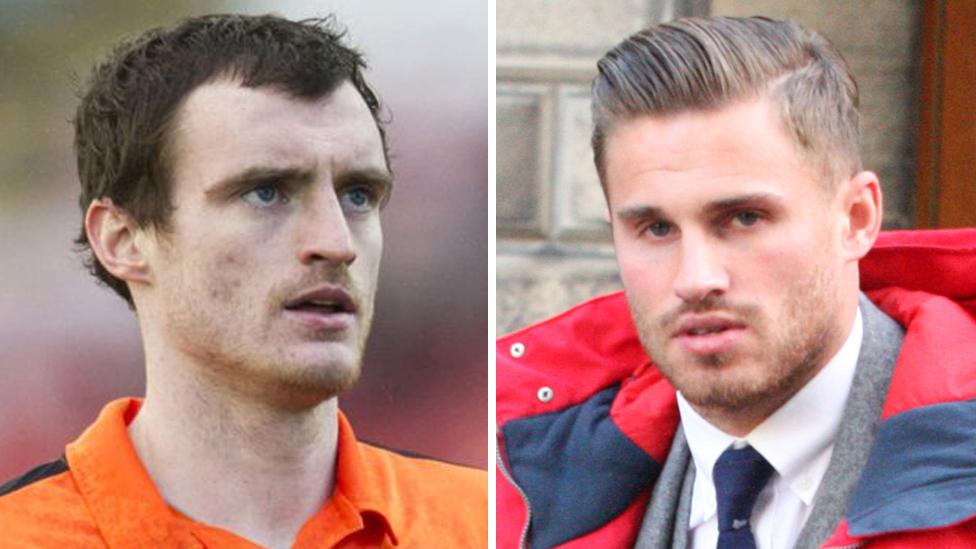Footballers Goodwillie and Robertson ruled as rapists
- Published

David Robertson (left) and David Goodwillie had claimed the sex was consensual
A former Scotland international footballer and his ex-teammate have been ruled to be rapists and ordered to pay £100,000 damages despite never facing a criminal trial.
Denise Clair, who was left "devastated" by a Crown decision not to prosecute, sued striker David Goodwillie.
She also sued Goodwillie's then Dundee United colleague David Robertson.
She claimed they raped her at a flat in Armadale, in West Lothian, after a night out in Bathgate in January 2011.
It was the first civil rape case of its kind in Scotland.
Ms Clair, who previously waived her right to anonymity, said she could not remember what happened after being in a Bathgate bar and woke up in a strange flat the following morning.
The 30-year-old originally sought £500,000 in compensation, but damages were later agreed at £100,000 in the civil action at the Court of Session in Edinburgh.
'Persuasive and compelling'
The mother-of-one maintained she was incapable of giving free agreement to sex because of her alcohol consumption, but Goodwillie, 27, who now plays with Plymouth Argyle, and Robertson claimed that intercourse had been consensual.
A judge said: "Having carefully examined and scrutinised the whole evidence in the case, I find the evidence of the pursuer (the woman) to be cogent, persuasive and compelling."

Denise Clair waived her right to anonymity
Lord Armstrong said: "In the result, therefore, I find that in the early hours of Sunday 2 January 2011, at the flat in Greig Crescent, Armadale, both defenders (the footballers) took advantage of the pursuer when she was vulnerable through an excessive intake of alcohol and, because her cognitive functioning and decision-making processes were so impaired, was incapable of giving meaningful consent; and that they each raped her."
The judge said he found neither Goodwillie - who also played for Aberdeen and Blackburn Rovers - or Robertson to be credible or reliable on the issue of whether they had a reasonable or honest belief that she was consenting.
He rejected evidence relied on by the players that Ms Clair was not particularly affected by alcohol and was no more drunk than anyone else in the company they had been in that night.
'Woman needed ambulance'
Lord Armstrong said that prior to the incident the victim had enjoyed life, but her life changed following the decision not to proceed with a prosecution.
Lord Armstrong said: "She found that decision difficult to understand and had felt that she had not been believed."
"She felt that her life had been destroyed by something which had happened although, because of her lack of memory, she was not fully aware of what it was that had caused that effect," he said.
Goodwillie had gone to join Robertson in Bathgate after the pair had played for Dundee United against Aberdeen on 1 January during which Goodwillie scored an equaliser.
He maintained that he did not think Ms Clair was too drunk to consent to sex.
However, a security firm employee working at the nightclub told the court that she had been in need of an ambulance.
Gayle McGregor said: "She wasn't in control of herself. Her eyes were rolling in her head. She couldn't stand up straight. She couldn't speak to me properly. She wasn't compos mentis."
In the action it was said the players offered her a lift home in a taxi, but the driver was requested to drop all three at the flat in Armadale.
A Plymouth Argyle spokesman said: "We note today's judgment from the Court of Session in Edinburgh regarding David Goodwillie.
"We await the full report, which we will consider in detail before making any comment.
"Until such time, David Goodwillie will not be selected to play for Plymouth Argyle."
The Crown Office said it stood by its previous decision not to prosecute the footballers.
A spokesman said: "As Lord Armstrong stated in his judgement, the standard of proof to be satisfied was that of the balance of probabilities which is a less onerous requirement than the standard in criminal cases, which is beyond reasonable doubt.
"Further, there is no requirement of corroboration in civil cases unlike in criminal cases.
"This case was looked at very carefully by Crown counsel who concluded that there was insufficient evidence in law to raise criminal proceedings. As a result no proceedings were instructed."